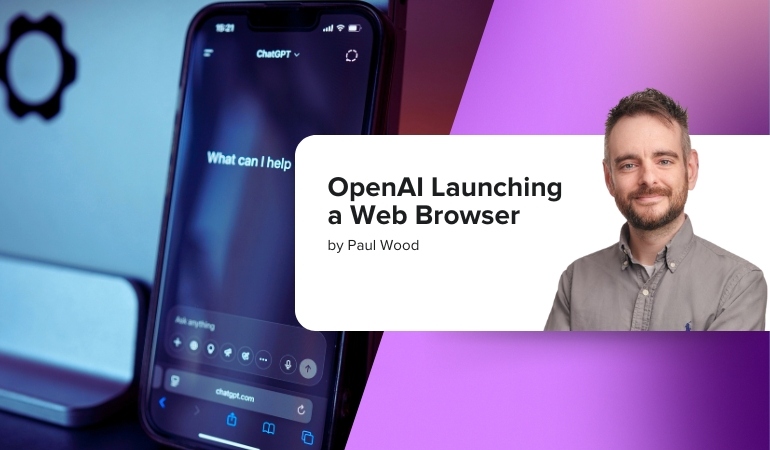OpenAI, the company behind ChatGPT, is preparing to launch its own web browser.
As reported by Reuters, the browser will launch ‘in the coming weeks’ and has been confirmed by three unnamed sources.
The web browser will put OpenAI in more direct competition with Google, whose Chrome is the market-leading web browser.
The browser will reportedly include a chat interface and will integrate with AI agents.
Why launch a ChatGPT browser?
OpenAI’s plan to launch a browser is said to be part of a strategy to capture increasing levels of user data.
It has been a key part of Google’s strategy, where Chrome’s dominance in the browser market provides the firm with unparalleled levels of user insight.
The data Chrome captures provides Google with an engine to funnel users to its search engine, and data to tailor its significant revenue generating advertising business.
Today’s news gives a clear indication that OpenAI has plans to take similar steps.
Using AI to change how we use the web
The Reuters report quotes its sources as claiming that OpenAI aspires to “fundamentally change how consumers browse the web.”
The article goes on to state that, “OpenAI's browser is designed to keep some user interactions within a ChatGPT-like native chat interface instead of clicking through to websites, two of the sources said.”
This follows a common trend that is seeing AI solutions disrupt the typical digital user journey, where answers are increasingly being provided at the point of search, and not pointing users to the originating source. Only last week, I wrote about the new phenomenon, dubbed, The Great Decoupling.
Aside from providing OpenAI with a new way to capture audience attention, it will also give the company a means to showcase its latest solutions.
This will include Operator, OpenAI’s automation solution that will, in theory, be able to carry out actions on the user’s behalf. Think of a web browser that can find and book train tickets for you.
“OpenAI decided to build its own browser, rather than simply a "plug-in" on top of another company's browser, in order to have more control over the data it can collect, one source said.”
Does this spell danger for Google?
Probably, yes.
Google’s stranglehold on the search and browser market is not to be underestimated, but OpenAI has captured the public’s imagination with ChatGPT.
In launching a ChatGPT focussed web browser, whilst not unique (Perplexity, The Browser Company, and Brave have all recently done similar), OpenAI is easily the highest profile brand to be putting its name to such a project.
Ironically, the browser is reported to be built on Chromium, the Google-owned engine that powers Google Chrome as well as a slew of other web browsers; there’s more on that in my colleague Luke’s article here.
What does it mean for marketers?
I’m increasingly viewing our industry as being in a state of flux at the moment. Firstly, clicks are harder to come by. Search engines and social networks are increasingly keen to keep hold of traffic.
AI tools are taking content and information and repurposing it. Users who do visit your website often do so via a complicated journey.
The days of search and click appear to be on the way out.
Tracking is also an increasingly tricky game. No more can website operators rely upon Google Analytics data, given the data protection and privacy rules that are now in force.
The rules of digital marketing remain true; it’s the job of a marketer to increase the notoriety of their brands and products. This is done through good content, smart campaigns, and engaging with people across multiple channels.
With the apparent shifting of power, though, it requires a more nuanced and less traceable approach.





